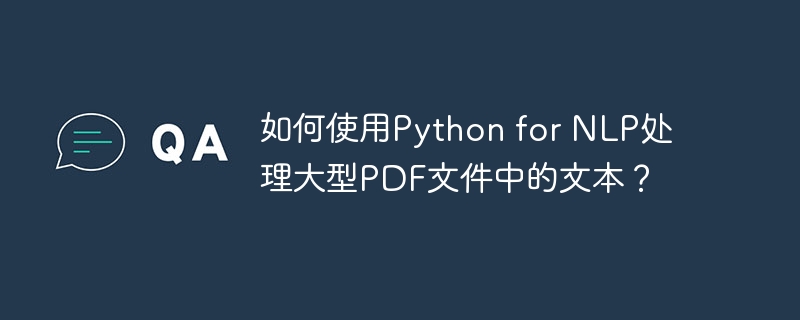

How to use Python for NLP to process text in large PDF files?
Abstract:
With the continuous advancement of technology, text extraction from large PDF files is becoming more and more common. Natural language processing (NLP) is a powerful tool for processing and analyzing large text data. This article will introduce how to use Python and NLP technology to process text in large PDF files, and provide specific code examples.
Introduction:
PDF is a common format used to store and transmit documents, and most companies and institutions use PDF files in their work. However, text in PDF files usually cannot be copied and extracted directly. Therefore, how to extract text from large PDF files has become one of the challenges faced by data analysts and researchers.
Python is a powerful programming language that provides many tools and libraries for processing large text data. NLP is a field that covers methods and techniques for processing and analyzing natural language. Combining Python and NLP, you can easily process text in large PDF files.
Step 1: Install the required libraries and tools
First, we need to install the required libraries and tools. It is recommended to use the PyPDF2 library to process PDF files and the NLTK library for NLP processing. You can install these libraries using the following command:
pip install PyPDF2 pip install nltk
Step 2: Import the required libraries
Once the libraries are installed, we can import them in the Python script:
import PyPDF2 from nltk.tokenize import word_tokenize from nltk.corpus import stopwords import string
Steps Three: Extract text from PDF files
We can use the PyPDF2 library to extract text from PDF files. Here is a sample code that shows how to open a PDF file and extract the text from it:
def extract_text_from_pdf(file_path):
with open(file_path, 'rb') as file:
pdf_reader = PyPDF2.PdfReader(file)
text = ""
for page_num in range(pdf_reader.numPages):
page = pdf_reader.getPage(page_num)
text += page.extract_text()
return textThis function will return a string containing the text extracted from the PDF file.
Step 4: Clean and prepare the text
Before performing NLP processing, we need to clean and prepare the text. Here is a sample code that shows how to use the NLTK library to clean and prepare text:
def clean_and_prepare_text(text):
# 分词
tokens = word_tokenize(text)
# 去除停用词
stop_words = set(stopwords.words('english'))
tokens = [word.lower() for word in tokens if word.lower() not in stop_words]
# 去除标点符号
tokens = [word for word in tokens if word not in string.punctuation]
# 过滤掉数字
tokens = [word for word in tokens if not word.isdigit()]
# 连接成字符串
cleaned_text = ' '.join(tokens)
return cleaned_textThis function will return a cleaned and prepared text string.
Step 5: Use NLP technology to process the text
Once we have prepared the text, we can use NLP technology to process it. The following is a sample code that shows how to use the NLTK library to perform word segmentation, part-of-speech tagging and named entity recognition on text:
import nltk
def process_text(text):
# 分词
tokens = word_tokenize(text)
# 词性标注
tagged_tokens = nltk.pos_tag(tokens)
# 命名实体识别
named_entities = nltk.chunk.ne_chunk(tagged_tokens)
return named_entitiesThis function will return the result of a named entity recognition.
Summary:
Using Python and NLP technology to process text in large PDF files is a powerful tool. This article describes the steps for using PyPDF2 and the NLTK library, and provides specific code examples. Hope this article is helpful for NLP tasks of processing text in large PDF files.
The above is the detailed content of How to process text from large PDF files using Python for NLP?. For more information, please follow other related articles on the PHP Chinese website!




